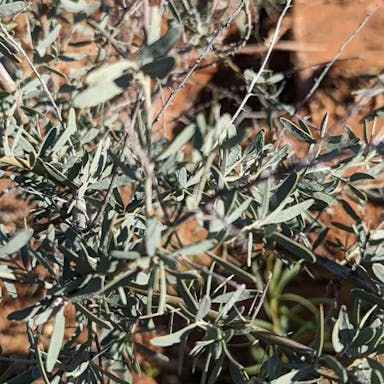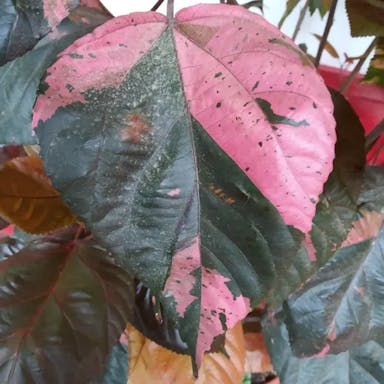Morning-kiss varieties include 'Bluebell' with vibrant blue flowers, 'Sunrise' with golden-yellow blooms, and 'Pink Charm' displaying delicate pink petals. When selecting seeds, opt for plump, firm ones without signs of damage. For seedlings, choose those with healthy green leaves and sturdy stems, avoiding any wilting or discoloration. Ensure the roots are well-developed and not root-bound. It is essential to check for any pests or diseases before purchasing. Always follow specific care instructions for each variety to promote optimal growth and flowering.
Morning-kiss
- Scientific name
- Rotheca microphylla
Basic Information
- Lamiaceae Family Rotheca Genus Morning-kiss Species
- Lamiaceae > Rotheca > Rotheca microphylla
- 83%
- The Completeness of This Encyclopedia
Please help us complete the encyclopedia, Terrarium is a encyclopedia service to be completed with everyone in the world. Currently, this page is 83% complete. For more information on how to contribute, please click here.
- Shrub
- Height
- 100cm ~
- Flower Color
- Leaf Color
- Anthesis
- summer
- Sunlight Exposure
Full Sun Long hours of sunlight from morning to afternoon Partial Shade A location in the shade of a tree or where either the morning or afternoon is shaded Full Shade A place where there is no direct sunlight
- Full Sun
- Hardiness Zones
This is an indicator to know to which zone each plant can winter. Knowing the zone of each plant gives you an idea of the cold temperature resistance when grown in the ground without a roof. 2: -42.7 to -40.0 3: -39.9 to -34.4 4: -34.3 to -28.9 5: -28.8 to -23.3 6: -23.2 to -17.8 7: -17.7 to -12.2 8: -12.1 to -6.7 9: -6.6 to -1.1 10: -1.0 to 4.4 11: 4.5 to 10.0
- 9
- Cold resistance
- Fair
- Heat resistance
- Good
- Habitat of origin
- South Africa
- Growth Rate
- Normal
What is Morning-kiss (Rotheca microphylla)?
What is Morning-kiss (Rotheca microphylla)
Flower meaning
Morning-kiss, also known as Rotheca microphylla, is a flowering plant native to tropical Africa. It belongs to the Verbenaceae family and is characterized by small, glossy, dark green leaves. The plant produces clusters of delicate, tubular flowers that come in shades of purple, blue, or white. Rotheca microphylla is a compact shrub that can reach a height of about 3 to 6 feet. The name "Morning-kiss" is derived from the plant's tendency to bloom profusely in the morning, attracting pollinators like bees and butterflies. It is relatively easy to grow, requiring well-drained soil and full to partial sunlight. The plant is often used in landscaping for its attractive foliage and colorful flowers. Rotheca microphylla is also known for its ornamental value and is commonly cultivated in gardens and parks. The plant may produce small, round fruits after flowering, adding to its visual appeal.
Calendar of Morning-kiss (Rotheca microphylla)
Calendar
Morning-kiss is susceptible to aphids, which can cause yellowing and curling of leaves. These pests can be controlled by introducing natural predators like ladybugs or through insecticidal soap. Additionally, Morning-kiss is prone to powdery mildew, a fungal disease that appears as white powdery spots on leaves. This can be prevented by ensuring good air circulation around the plant and avoiding overhead watering. Another common issue is root rot, often caused by overwatering or poorly-draining soil. To prevent this, it is essential to allow the soil to dry out between waterings and ensure proper drainage. Lastly, spider mites can infest Morning-kiss, leading to stippled leaves and webbing. These pests can be deterred by regularly misting the plant and keeping humidity levels high.
How to grow Morning-kiss (Rotheca microphylla)
Watering
The flower language commonly used in America for the plant called Morning-kiss is as follows: - Affection - Love - Adoration - Romance One typical example is "Affection," symbolizing a deep fondness and care for someone. It conveys warmth and tenderness in a relationship.
Soil and Fertilizer
Morning-kiss thrives in full sun, requiring at least 6 hours of direct sunlight daily. It exhibits excellent heat tolerance, preferring temperatures between 65-75°F (18-24°C). Cold tolerance is limited, with temperatures below 50°F (10°C) potentially causing damage. During summer, ensure adequate watering to prevent wilting. In winter, protect from frost by moving indoors or covering with a frost cloth. Morning-kiss should be placed in a location with well-draining soil to avoid waterlogging. It benefits from regular pruning to maintain shape and promote new growth. Optimum sunlight exposure enhances flowering and overall plant health.
Sunlight and Place
For the Morning-kiss plant, watering frequency should be every 7-10 days during the growing season. Ensure the soil is moderately moist but not waterlogged, allowing the top 1-2 inches to dry out between waterings. During the dormant season, reduce watering to every 2-3 weeks to prevent overwatering. Adjust watering based on environmental conditions such as temperature and humidity to avoid root rot. Monitor the plant's response to watering to determine the optimal schedule for your specific growing conditions.
Advanced Information of Morning-kiss (Rotheca microphylla)
Pruning
Morning-kiss thrives in well-draining soil with a pH level between 6.0 and 7.0. It prefers loamy soil rich in organic matter. Fertilize Morning-kiss with a balanced fertilizer, such as 10-10-10, in early spring before new growth begins. Apply the fertilizer at a rate of 1 pound per 100 square feet of planting area. Repeat the application every 6-8 weeks during the growing season. Avoid over-fertilizing, as it can lead to excessive foliage growth at the expense of flowers. Monitor the plant's growth and adjust the fertilizer application accordingly.
Planting and Harvest
Morning-kiss plants benefit from regular pruning to maintain their shape, promote new growth, and improve overall health. Pruning is necessary to remove dead or damaged branches, encourage flowering, and prevent overcrowding. It is best to prune Morning-kiss plants in late winter or early spring before new growth begins. Use clean, sharp pruning shears to make clean cuts just above a leaf node or lateral branch. After pruning, water the plant thoroughly and apply a balanced fertilizer to support recovery and new growth. Regular pruning will help Morning-kiss plants thrive and remain vibrant in your garden.
Propagation
Morning-kiss is best potted for optimal growth and control of its spreading nature. When potting, choose a well-draining potting mix to prevent waterlogging, and ensure the pot has drainage holes. Place the plant in a location with bright, indirect sunlight and maintain consistent watering, allowing the soil to dry slightly between waterings. Repot Morning-kiss every 1-2 years in a slightly larger pot to accommodate its growth. If the plant becomes root-bound or outgrows its pot, gently loosen the roots during repotting. Mishowing, such as yellowing leaves or stunted growth, may indicate overwatering or insufficient light.
Pests and Diseases
Morning-kiss can be propagated through seeds, division, and cuttings. Sow seeds in well-draining soil, keeping them moist until germination. Division involves separating plant clumps into smaller sections, ensuring each has roots attached. Cuttings should be taken from healthy stems, removing lower leaves and planting in a rooting medium. For leaf cuttings, select healthy leaves, place them in a moist medium, and wait for roots to develop. To maximize propagation success, use a combination of methods to increase the chances of new plants. Harvest seeds when mature, divide plants in the spring or fall, take cuttings in the growing season, and use leaf cuttings during active growth periods.
Habitat of Morning-kiss (Rotheca microphylla)
Habitat
Toxicity of Morning-kiss (Rotheca microphylla)
Health Benefits
- edible
- Inedible
- Toxic
- No toxicity
NO DATA
Toxic for dogs and cats
NO DATA












